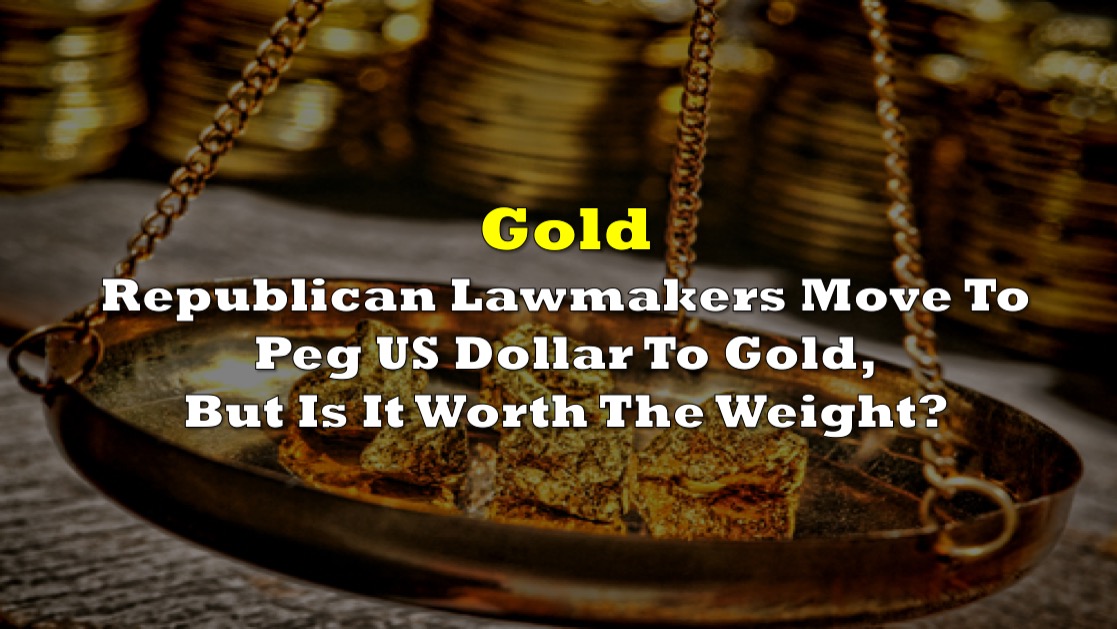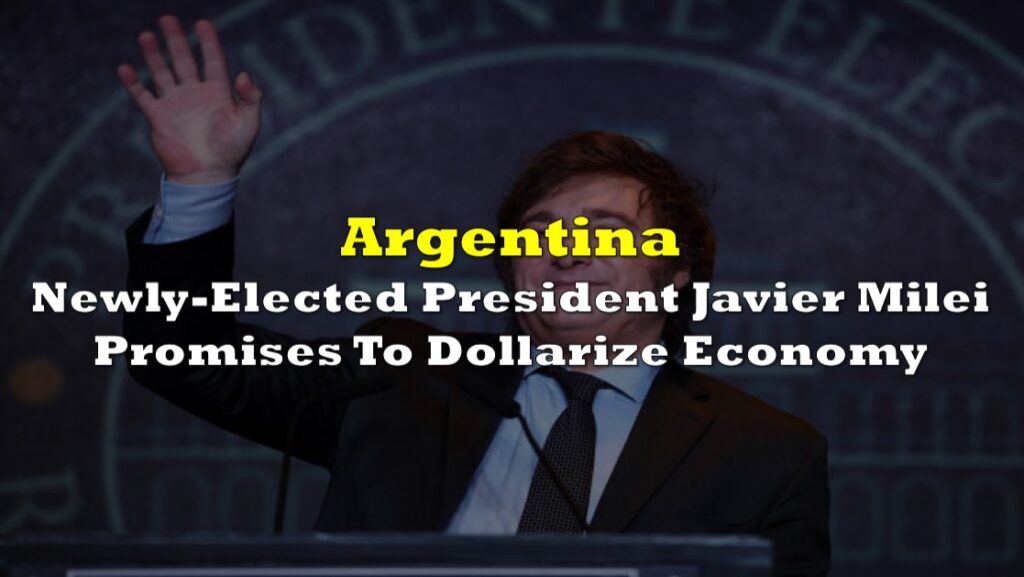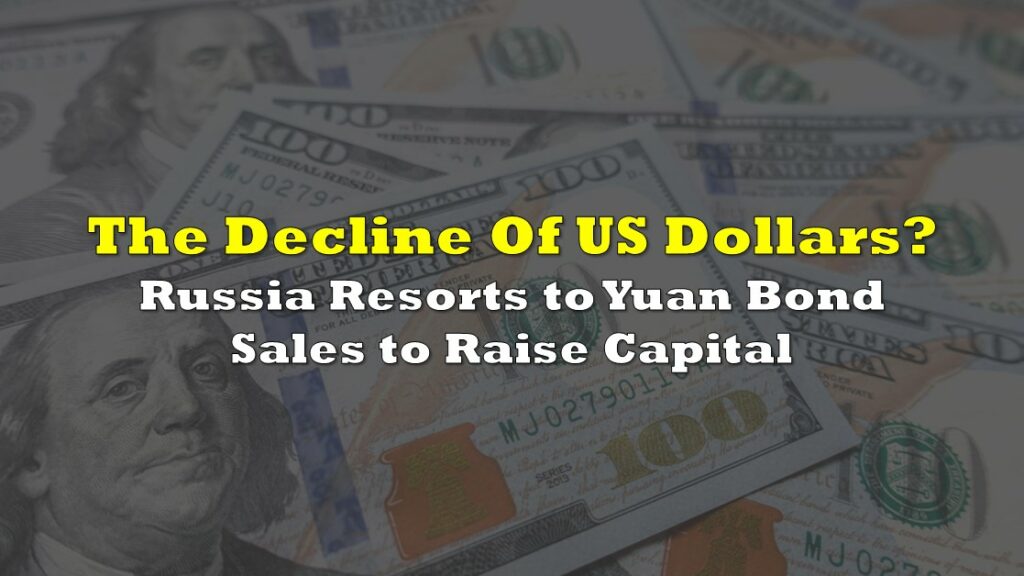In arguably one of the worst economic situations in the US amid rising interest rate hikes and bank failures, three Republican lawmakers introduced a bill to peg again the Federal Reserve note “dollar” to the value of a fixed weight of gold bullion.
West Virginia Rep. Alex Mooney, joined by Arizona Reps. Andy Biggs and Paul Gosar, introduced HR 2435 or the “Gold Standard Restoration Act” to define the dollar as a fixed weight of gold. The bill is on its first step and has been introduced to the House Committee on Financial Services.

Following the passing of HR 2435, the US Treasury and Federal Reserve will have 24 months to publicly declare all gold holdings and gold transactions, at which point the Federal Reserve note “dollar” will be formally repegged to a set weight of gold at its then-market price.
Federal Reserve notes would be completely redeemable and exchangeable for gold at the new price, with the US Treasury and its gold holdings acting as guarantor.
Mooney said in a statement that “a gold standard would protect against Washington’s irresponsible spending habits and the creation of money out of thin air.”
“Prices would be shaped by economics rather than the instincts of bureaucrats. No longer would American families, businesses, and the economy as a whole be at the mercy of the Federal Reserve and reckless Washington spenders,” the Arizona congressman said.
Today, I addressed the House on the Gold Standard Restoration Act. My bill would return the U.S. to the gold standard, protect against Washington’s irresponsible spending habits and the creation of money out of thin air. pic.twitter.com/g1iP7RTQdJ
— Rep. Alex Mooney (@RepAlexMooney) December 2, 2022
The bill also makes various findings regarding the harm caused on ordinary Americans by the Federal Reserve System, particularly after President Richard Nixon “temporarily suspended” gold backing of America’s monetary system in 1971.
The proponents also noted in their findings that under the 2% inflation target, the dollar is already losing “half of its purchasing power every generation, or 35 years.”
“The Federal Reserve note has lost more than 40 percent of its purchasing power since 2000, and 97 percent of its purchasing power since the passage of the Federal Reserve Act in 1913,” the bill’s introduction noted.
The bill, in the hopes of enabling the market and market participants to arrive at the fixed Federal Reserve note dollar-gold parity, will require the Secretary and the Federal Reserve to make publicly available “all holdings of gold, with a report of any purchases, sales, swaps, leases, and any other financial transactions involving gold, since the temporary suspension in August 15th, 1971, of gold redeemability obligations under the Bretton Woods Agreement of 1944.”
“The gold standard puts control of the money supply with the market instead of the Federal Reserve, discourages excessive deficit spending, and encourages the balancing of Federal budgets,” the bill argued.
In March, the Federal Reserve, along with the Bank of Canada, the Bank of England, the Bank of Japan, the European Central Bank and the Swiss National Bank, announced a coordinated effort to increase US dollar liquidity via the opening of daily swap lines — an exact repeat of Fed Chair Jerome Powell’s dash-for-cash monetary policy framework unleashed during the COVID pandemic.
Will it pass?
Historians have observed that the removal of gold redeemability from the monetary system removed accountability from central bankers and federal government officials when they expanded the money supply, funded government deficits through trillion-dollar bond purchases, or otherwise manipulated the economy.
“Today’s debt-based fiat-money system serves primarily to support big government and wealthy financial insiders – while the Federal Reserve’s serial policy of currency debasement punishes savers and wage earners,” explained Stefan Gleason, President of the Sound Money Defense League and Money Metals Exchange. “A return to gold redeemability would arrest the problem of inflation, restrain the growth of wasteful and inefficient government, and kick off an exciting new era of American prosperity.”
Lawrence W. Reed, president emeritus of the Foundation for Economic Education, noted that “the gold standard never failed America, bad ideas and bad politicians did” as he throws his support for the bill.
But, the timing of the bill is not ideal as the US enters the 2024 national election season. Increasing money supply into the market will be a critical agenda as the country faces an already tight economy.
While the House is currently controlled by the Republicans, the Senate is still held by the Democrats. It is also unlikely that US President Joe Biden will sign the bill if it reaches his desk given the big investment and infrastructure spending bills he put into law during his first term.
The "Gold Standard Restoration Act" (H.R. 2435) has been introduced by 3 US congressmen, to return the U.S. to a gold standard, in response to concerns over inflation and bank failures.
— Andrew Lokenauth (@FluentInFinance) April 5, 2023
The bill aims to repeg the Federal Reserve note "dollar" to a fixed weight of gold bullion,…
Gold is currently riding near all-time high prices, breaching the $2,000-mark again this month. If the commodity continues the trend, the market value for gold would be far different from where it was in 1971–putting a greater value for the Federal Reserve note “dollar” if the bill passes.
Probably something to (re)consider as the world gears towards a multipolar currency economic order.

Information for this briefing was found via the sources mentioned. The author has no securities or affiliations related to this organization. Not a recommendation to buy or sell. Always do additional research and consult a professional before purchasing a security. The author holds no licenses.









